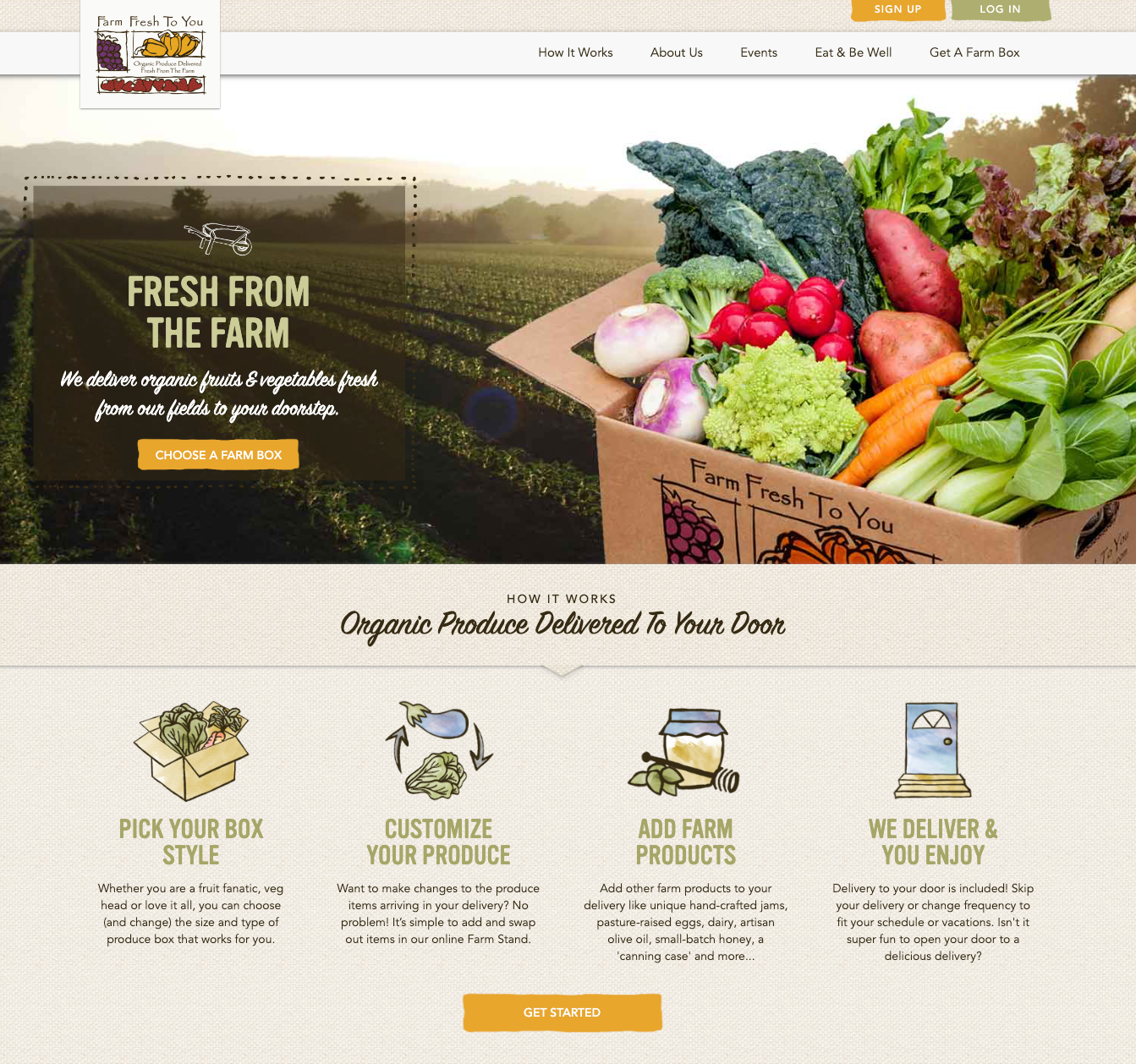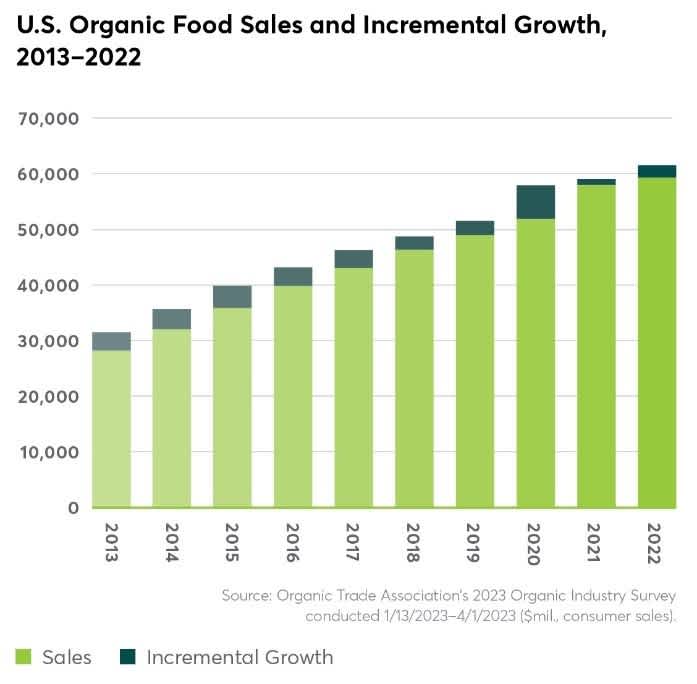2024 Guide: Innovative Ways to Make Money from Your Small Farm
Published: December 26, 2023

Have you wondered how to make money as a farmer? Imagine turning your small farm into a lucrative enterprise. Equating it to having a gold mine buried beneath your daisies, within arms' reach, just waiting to be tapped into.
Welcome to the era where small scale farming becomes an enviable money-spinning venture, thanks in large part to fresh, innovative ideas. Intrigued? You should be.
It was estimated that the gross production value in the agriculture market was over US$3.69 trillion in 2023. That's enough money to purchase every NFL team twenty times over! We'll be exploring this gigantic, flourishing industry, showcasing how you, the small farm owner, can clinch a slice of this massive pie.
So, will your farm life contribute to this mammoth figure or sit idly on the sidelines? Let's take this journey of agricultural prosperity together.
Profitable Farming Ideas: Turning Your Passion into Profitable crops
Diversifying Crop Production: The Key to Higher Earnings
Farm diversity isn't just a buzzword - it’s a practical approach to farm life based on years of global trial and error by farmers. It involves growing various crops, instead of one crop, on your piece of land. Not only does it prevent the soil from being exhausted of nutrients, but it also provides a safety net if one crop fails due to weather conditions or pests.

Examples of promising crops to consider include roots, legumes, gourmet mushrooms, medicinal herbs, or heirloom fruits and veggies. These niche crops cater to specific markets ready to pay a premium for hard-to-find items. Small-scale farmers can identify and explore these lucrative markets with some research and marketing.
Livestock Farming: A Lucrative Venture
Livestock farming is one of the most profitable ventures in the agricultural sector. It's the practice of raising animals for food, fiber, or labor. The options are plentiful - from dairy cows, poultry, and pigs to beekeeping or fish farming. The profitability varies according to the demand cost of feeding and rearing, among other factors.
Success in livestock farming involves strategic planning, efficient management practices, and studying your local market. Nutrition and health management of the animals are crucial, so knowledge of animal husbandry is a must. Remember that flexibility and adaptability can go a long way in successfully managing and making a profit in this sector.
Agripreneurship Opportunities: Exploring New Avenues in Farming
Agritourism: A Growing Trend in the Farming Industry

Agritourism is an emerging trend that combines farming with travel. This unique blend of industries attracts individuals seeking unique, educational, and genuine experiences, becoming a profitable venture for your farm business.
To tap into the agritourism market, you will need a business plan highlighting your farm's unique features, whether that’s your harvesting techniques, a particular fruit you grow, or the stunning landscapes your farm has to offer. Your plan should also include accommodation, recreational activities, and travel itinerary details. Remember, your aim should be to offer your visitors an immersive, educational, and fun farming experience.
Regulations for agritourism vary, and understanding them clearly is crucial. Guidance from a local agricultural extension office, tourism board, or a lawyer can help streamline this process. Remember, managing your legal responsibilities meticulously is paramount to ensure the success and longevity of your agripreneurship ventures.
Farm-to-Table Restaurants: Serving Fresh and Local

Farm-to-table is more than just a buzzword; it’s a commitment to serving dishes made from local, fresh produce straight from the farm. Not only does this approach guarantee the freshness and quality of ingredients, but it also supports local economies, fosters sustainability, and promotes transparency in sourcing.
Getting started with a farm-to-table restaurant involves sourcing and planning. Talk to local farmers, attend farmers' markets, and learn about the seasonal availability of different products. This will help you establish relationships and increase your understanding of the seasonal component of your restaurant menu.
One of the keys to running a successful farm-to-table restaurant is adapting to what's available and in season. Your menu should reflect this adaptability, offering rotating seasonal dishes based on the local produce available. Lastly, be transparent with your customers; let them know where their food comes from and why it matters. This transparency can become your selling point, enabling you to carve a unique space in the competitive restaurant landscape.
This influx of innovative approaches to farming is paving the way for agripreneurship to thrive. Remember, success relies heavily on tapping into the market at the right time with the right product; these ventures are no different. Your small farm could be the next big thing in agritourism or the supplier of the freshest, best-tasting food in town. It's all about exploring the opportunities and making strategic decisions.
Small Farm Income Ideas: Making the Most of Your Land
Financial stability offers peace of mind, and renting out your farmland is one avenue to achieve this. The demand for farmland, be it for farming or other means, is rising steadily, and capitalizing on this trend could be a gamechanger for your small farm. In this section, we will cover the advantages of this venture and the ways to proceed effectively.
Renting Farmland: A Steady Source of Income
Turning your underused acres into rental grounds brings in several benefits. Aside from the obvious financial gains, you also contribute to local development, potentially supporting other small businesses that rent your land. It's a constructive utilization of your resources and a chance to diversify your cash inflow, thus building financial resilience against unforeseen circumstances.
But renting out farmland isn’t as simple as sticking a “For Rent” sign on the field. Pricing considerations, contract terms, and finding reliable tenants are only a few issues you'll need to navigate. Key steps include examining market rates, getting legal advice on contracts, and advertising on local farm networks or platforms specializing in farmland rentals. Ensuring the potential tenant has a solid farming plan and can care for the land properly is also crucial for long-term success.
Renting Tiny Homes: Small home, steady income
Instead of making money farming the traditional methods, you can combine this strategy focused on the Agritourism market by allowing guests to rent tiny houses on your land. A tiny house is usually around 600 square feet or less, so building these tiny houses typically requires less capital, and you can build several at a time if you're opening up a larger venture.
Selling Farm Products Online: Reaching a Wider Market

The wonders of internet technology have reached the farming industry, creating a broader market for farm goods. Small farms can now compete with bigger counterparts by simply leveraging their online presence. We will dive into this evolving marketplace trend and get practical tips on effectively selling farm products online.
Online marketplaces for farm items have become progressively popular in recent years. They serve as a digital bridge between farms and consumers, especially those in urban areas who crave fresh, traceable produce. Such platforms allow farms to directly reach consumers, bypassing middlemen, which usually results in better pricing control and profit margins.
Yet, selling farm products online is not without challenges. The competition is tough, and standing out in a crowded digital market demands more than quality products. Excellent customer service, satisfying user experience, and engaging product presentation are equally essential.
Ensure your website or page on a marketplace is appealing and easy to navigate. In addition, consider offering a diverse product selection or unique items to give potential buyers a reason to choose you over your competitors. Finally, remember that digital marketing strategies, like social media advertising and search engine optimization, can significantly boost your online visibility and sales.
Sustainable Farming for Profit: Balancing Earnings and Environment
Organic Farming: Catering to the Health-Conscious Market

Did you know that organic food sales reached $60 billion in 2022? Yes, you read that right! The organic industry has been booming, and it's a ripe market for small farm owners like you.
Consider trying your hand at organic farming. It's not only a healthier alternative to traditional farming, but it's also a great way to capture the attention of the growing health-conscious market.
The Demand for Organic Products and Its Profitability
The demand for organic products is undeniable. Consumers are becoming more discerning about what they put on their plates and are willing to pay a premium for quality organic goods. Couple this with the fact that organic farming practices are inherently sustainable, and you're on your way to achieving profitable, eco-friendly farming.
Steps to Transition into Organic Farming
Transitioning to organic farming may sound daunting, but it doesn't have to be. Start with small steps like learning about the organic certification process and shortlisting crops that could be grown organically on your farm. Also, remember that transitioning takes time—on average, it takes three years to transition from non-organic to organic-certified farmland.
Renewable Energy Farming: Harnessing the Power of Nature
Another innovative way to earn from your farm is through renewable energy farming. Wind turbines, solar panels, or biodigesters can be additional income streams. Plus, they conserve resources and contribute to mitigating climate change—an added bonus!
The Potential of Renewable Energy Farming
Renewable energy farming offers striking potential. Yes, the investment might seem intimidating (a business loan may be needed here); however, the long-term returns are worth considering. Wind, solar, and biomass sources provide consistent income over time while reducing reliance on non-renewable energy sources.
How to Start a Renewable Energy Farm
Building a renewable energy farm requires informed planning. Start by evaluating the sun or wind exposure or the waste resources on your farm. Consult with industry experts or local agencies to help assess your site's potential. Following these initial steps can harness nature's power for your farm's prosperity and sustainability.
Organic and renewable energy farming is just the tip of the iceberg regarding innovative ways to make money from your small farm. Education, preparation, and a passion for what you do are key ingredients in farming success.
Farm Side Hustles: Extra Income Opportunities for Farmers
Farming Workshops and Classes: Sharing Your Expertise
As small-scale farming practices continue to gain popularity, the demand for farming workshops and classes has surged considerably. From city dwellers longing for a taste of bucolic life to aspiring small-scale farmers, a growing audience is eager to learn the ropes of farming.
Farming workshops provide educational opportunities to share your technical knowledge and expertise with others, generating extra income and bolstering your farm's visibility and reputation.
Starting your own farming workshops and classes requires careful planning. Firstly, identify what specific topics or skills you want to teach - soil management, organic farming practices, or livestock rearing. Then, consider safety measures to assess your premises’ capacity to accommodate participants. Promote your classes through local communities or online platforms to reach a larger audience. An essential step is legal due diligence – ensure you are equipped and insured to teach publicly.
Farm Bed and Breakfast: Offering a Unique Experience
Increasingly, people are seeking unique getaways from their routine lives, and farms that offer bed and breakfast services are charting the trend in 'agritourism.' As a relaxing countryside retreat, a farm bed and breakfast can cater to those who crave rustic tranquility, a scenic backdrop, and hands-on farming experiences.
Starting a farm bed and breakfast involves various stages. First, assess your property for suitability. Farms with distinct features, such as a historic farmhouse or idyllic scenery, add to the guest experience.
Next, make necessary modifications to your property to accommodate guests comfortably. Remember, a significant part of your farm's appeal lies in its rustic charm, so balance modern comfort with your farm’s authentic touch.
Secure necessary permissions and insurance – your farm must comply with hospitality laws. Finally, consider marketing channels to reach potential guests, including digital platforms, agritourism boards, or local tourism offices. Your successful venture will diversify farm income while enhancing the farm’s visibility and reputation.
Innovativeness remains key in profitable small farming – and these 'side hustles' represent just a couple of the endless possibilities.
Offering workshops and establishing a bed and breakfast supplement your income and contribute significantly to the farming community and the agritourism industry. With the appropriate planning and promotion, these ventures can be financially and personally rewarding.
Harness Your Farm's Potential This Year
Small farming is not just about sowing and reaping anymore. Diversify with agri-tourism, teaching classes, or venturing into organic specialty crops. Leverage online platforms for direct sales and consider renewable energy options.
Embrace this insight because your small farm has untapped wealth; your asset isn't only your land, creativity, and entrepreneurship. Now's the time to innovate and build additional income streams that align with your passion and values.
Ready to start? Dive into researching these options. Create a plan, decide which aligns best with your goals, and invest in it. Turn your hobby farm into a full business by starting small, measuring success and scaling up overtime.
If you could implement one of these strategies on your farm today, which would it be? Stir that entrepreneurial spirit within, and let this be your year of farm-to-fortune success!
Keep track of all your cattle with the #1 Cattle Management Software
Try out Ranchr today for free